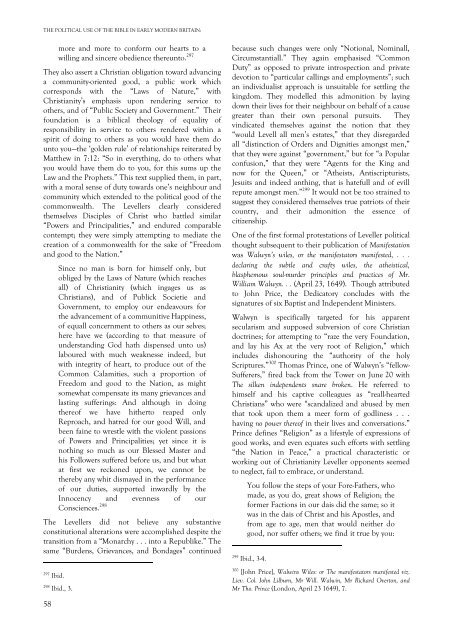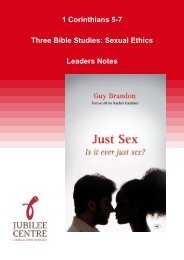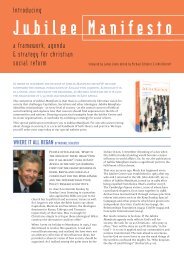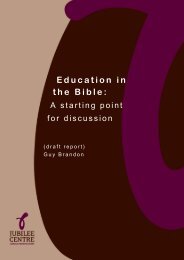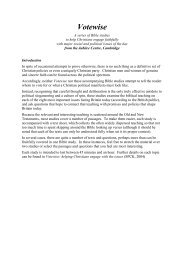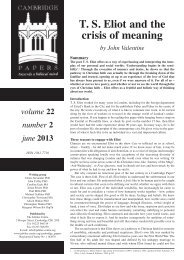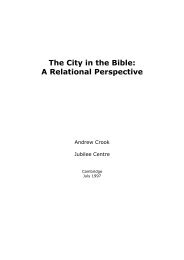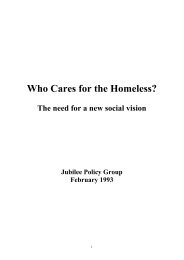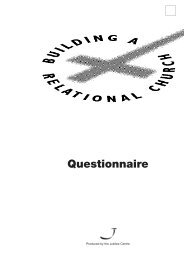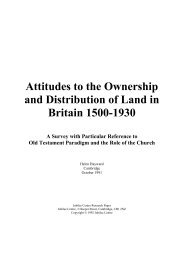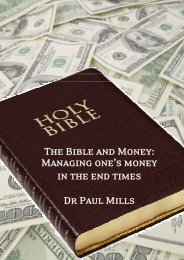Report Template - Jubilee Centre
Report Template - Jubilee Centre
Report Template - Jubilee Centre
You also want an ePaper? Increase the reach of your titles
YUMPU automatically turns print PDFs into web optimized ePapers that Google loves.
THE POLITICAL USE OF THE BIBLE IN EARLY MODERN BRITAIN:<br />
more and more to conform our hearts to a<br />
willing and sincere obedience thereunto. 297<br />
They also assert a Christian obligation toward advancing<br />
a community-oriented good, a public work which<br />
corresponds with the “Laws of Nature,” with<br />
Christianity’s emphasis upon rendering service to<br />
others, and of “Public Society and Government.” Their<br />
foundation is a biblical theology of equality of<br />
responsibility in service to others rendered within a<br />
spirit of doing to others as you would have them do<br />
unto you—the ‘golden rule’ of relationships reiterated by<br />
Matthew in 7:12: “So in everything, do to others what<br />
you would have them do to you, for this sums up the<br />
Law and the Prophets.” This text supplied them, in part,<br />
with a moral sense of duty towards one’s neighbour and<br />
community which extended to the political good of the<br />
commonwealth. The Levellers clearly considered<br />
themselves Disciples of Christ who battled similar<br />
“Powers and Principalities,” and endured comparable<br />
contempt; they were simply attempting to mediate the<br />
creation of a commonwealth for the sake of “Freedom<br />
and good to the Nation.”<br />
Since no man is born for himself only, but<br />
obliged by the Laws of Nature (which reaches<br />
all) of Christianity (which ingages us as<br />
Christians), and of Publick Societie and<br />
Government, to employ our endeavours for<br />
the advancement of a communitive Happiness,<br />
of equall concernment to others as our selves;<br />
here have we (according to that measure of<br />
understanding God hath dispensed unto us)<br />
laboured with much weaknesse indeed, but<br />
with integrity of heart, to produce out of the<br />
Common Calamities, such a proportion of<br />
Freedom and good to the Nation, as might<br />
somewhat compensate its many grievances and<br />
lasting sufferings: And although in doing<br />
thereof we have hitherto reaped only<br />
Reproach, and hatred for our good Will, and<br />
been faine to wrestle with the violent passions<br />
of Powers and Principalities; yet since it is<br />
nothing so much as our Blessed Master and<br />
his Followers suffered before us, and but what<br />
at first we reckoned upon, we cannot be<br />
thereby any whit dismayed in the performance<br />
of our duties, supported inwardly by the<br />
Innocency and evenness of our<br />
Consciences. 298<br />
The Levellers did not believe any substantive<br />
constitutional alterations were accomplished despite the<br />
transition from a “Monarchy . . . into a Republike.” The<br />
same “Burdens, Grievances, and Bondages” continued<br />
297<br />
Ibid.<br />
298<br />
Ibid., 3.<br />
because such changes were only “Notional, Nominall,<br />
Circumstantiall.” They again emphasised “Common<br />
Duty” as opposed to private introspection and private<br />
devotion to “particular callings and employments”; such<br />
an individualist approach is unsuitable for settling the<br />
kingdom. They modelled this admonition by laying<br />
down their lives for their neighbour on behalf of a cause<br />
greater than their own personal pursuits. They<br />
vindicated themselves against the notion that they<br />
“would Levell all men’s estates,” that they disregarded<br />
all “distinction of Orders and Dignities amongst men,”<br />
that they were against “government,” but for “a Popular<br />
confusion,” that they were “Agents for the King and<br />
now for the Queen,” or “Atheists, Antiscripturists,<br />
Jesuits and indeed anthing, that is hatefull and of evill<br />
repute amongst men.” 299 It would not be too strained to<br />
suggest they considered themselves true patriots of their<br />
country, and their admonition the essence of<br />
citizenship.<br />
One of the first formal protestations of Leveller political<br />
thought subsequent to their publication of Manifestation<br />
was Walwyn’s wiles, or the manifestators manifested, . . .<br />
declaring the subtle and crafty wiles, the atheistical,<br />
blasphemous soul-murder principles and practices of Mr.<br />
William Walwyn. . . (April 23, 1649). Though attributed<br />
to John Price, the Dedicatory concludes with the<br />
signatures of six Baptist and Independent Ministers.<br />
Walwyn is specifically targeted for his apparent<br />
secularism and supposed subversion of core Christian<br />
doctrines; for attempting to “raze the very Foundation,<br />
and lay his Ax at the very root of Religion,” which<br />
includes dishonouring the “authority of the holy<br />
Scriptures.” 300 Thomas Prince, one of Walwyn’s “fellow-<br />
Sufferers,” fired back from the Tower on June 20 with<br />
The silken independents snare broken. He referred to<br />
himself and his captive colleagues as “reall-hearted<br />
Christians” who were “scandalized and abused by men<br />
that took upon them a meer form of godliness . . .<br />
having no power thereof in their lives and conversations.”<br />
Prince defines “Religion” as a lifestyle of expressions of<br />
good works, and even equates such efforts with settling<br />
“the Nation in Peace,” a practical characteristic or<br />
working out of Christianity Leveller opponents seemed<br />
to neglect, fail to embrace, or understand.<br />
You follow the steps of your Fore-Fathers, who<br />
made, as you do, great shows of Religion; the<br />
former Factions in our dais did the same; so it<br />
was in the dais of Christ and his Apostles, and<br />
from age to age, men that would neither do<br />
good, nor suffer others; we find it true by you:<br />
299<br />
Ibid., 3-4.<br />
300<br />
[John Price], Walwins Wiles: or The manifestators manifested viz.<br />
Liev. Col. John Lilburn, Mr Will. Walwin, Mr Richard Overton, and<br />
Mr Tho. Prince (London, April 23 1649), 7.<br />
58


